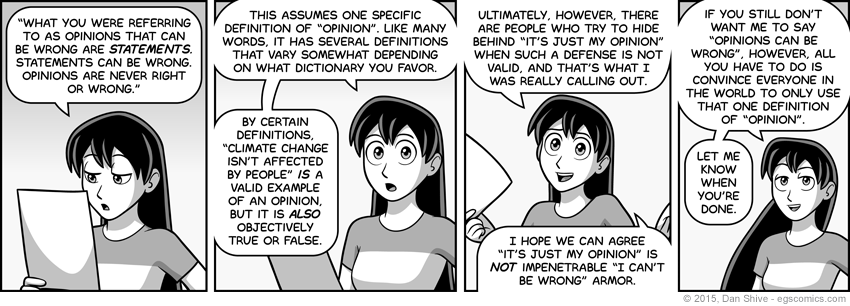Difference between revisions of "Opinion equivocation"
Jump to navigation
Jump to search
(Created page with "<hide> page type::article thing type::logical fallacy </hide> ==About== Opinion equivocation is a logical fallacy which is most commonly found in any of three...") |
|||
| Line 4: | Line 4: | ||
</hide> | </hide> | ||
==About== | ==About== | ||
| − | [[Opinion equivocation]] is a [[logical fallacy]] | + | [[Opinion equivocation]] is a [[logical fallacy]] about [[opinion]]s, most commonly found in any of three forms: |
* "[[cwre:So what/if/everyone is entitled to an opinion|everyone is entitled to their own opinion]]": 3rd person, defending: "this person's unsourced opinion is just as valid as the verifiable facts you presented" | * "[[cwre:So what/if/everyone is entitled to an opinion|everyone is entitled to their own opinion]]": 3rd person, defending: "this person's unsourced opinion is just as valid as the verifiable facts you presented" | ||
* "[[that's your opinion]]": 2nd person, attacking: "your verifiable facts are no more valid than an opinion" | * "[[that's your opinion]]": 2nd person, attacking: "your verifiable facts are no more valid than an opinion" | ||
| − | * "I'm entitled to my opinion": 1st person, defending: "my unsourced opinion is just as valid as the verifiable facts you presented" | + | * "I'm entitled to my opinion" or "It's just my opinion": 1st person, defending: "my unsourced opinion is just as valid as the verifiable facts you presented" |
It is a form of [[source equivocation]] – the idea that all sources are equally valid as evidence. | It is a form of [[source equivocation]] – the idea that all sources are equally valid as evidence. | ||
| + | |||
| + | [[File:1438609893-NP-150803-33c opinions2.png]] | ||
Latest revision as of 13:44, 13 October 2021
About
Opinion equivocation is a logical fallacy about opinions, most commonly found in any of three forms:
- "everyone is entitled to their own opinion": 3rd person, defending: "this person's unsourced opinion is just as valid as the verifiable facts you presented"
- "that's your opinion": 2nd person, attacking: "your verifiable facts are no more valid than an opinion"
- "I'm entitled to my opinion" or "It's just my opinion": 1st person, defending: "my unsourced opinion is just as valid as the verifiable facts you presented"
It is a form of source equivocation – the idea that all sources are equally valid as evidence.
